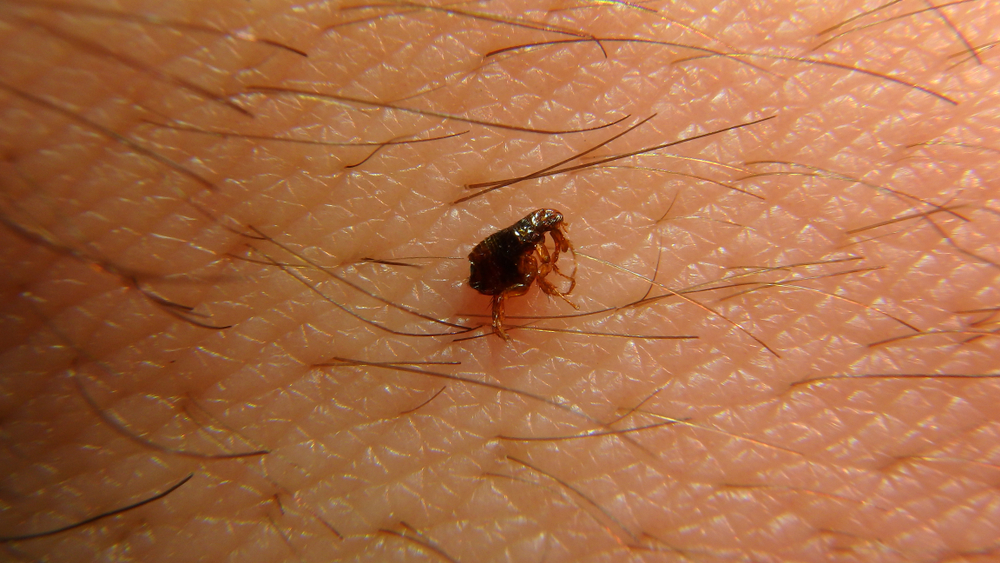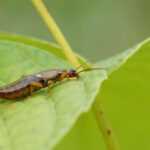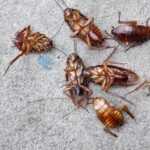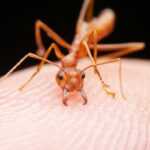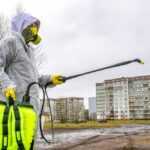Top Methods on How to Get Rid of Fleas on Humans Quickly
Wondering how to get rid of fleas on humans? Flea bites can be irritating and uncomfortable, but you can take effective measures to eliminate them and protect your health. This article will explain how to identify flea bites, immediate actions to take, home remedies, over-the-counter treatments, and preventive strategies to keep fleas away.
- Immediate cleaning with soap and water and application of remedies are vital for alleviating flea bite symptoms and preventing infection.
- Regular home maintenance, including vacuuming carpets and furniture and washing pet bedding in hot water, is essential for preventing flea infestations.
- Understanding the flea life cycle, including flea eggs and larvae, is crucial for effective control and re-infestation prevention, requiring follow-up treatments within specific time frames.
Understanding Flea Bites on Humans
Fleas are tiny, dark brown, wingless insects with six legs that can become a significant problem for humans, especially in the absence of pets like cats and dogs. While female fleas prefer to bite warm-blooded animals, they will not hesitate to bite humans if no other hosts are available. These bites typically appear as small, reddish bumps on the skin and are often found in clusters or lines, causing intense itching and irritation. The human flea is particularly known for its ability to thrive in such environments.
The symptoms from flea bites can range from mild itching to severe allergic reaction, depending on an individual’s sensitivity. Some people may experience significant discomfort, while others might only notice minor irritation. Recognizing these symptoms helps in identifying and addressing the issue promptly.
Early recognition of flea bites can prevent severe reactions and complications such as secondary infections or diseases like murine typhus and cat scratch disease. If you notice small red bumps that itch intensely, you’ve likely been bitten by fleas. Immediate action can help alleviate symptoms and reduce the risk of further bites.
Immediate Actions to Take When Bitten
Upon discovering flea bites, thoroughly clean the affected area with warm, soapy water. This simple act can significantly reduce the risk of infection and help soothe the irritation. Applying a cool compress to the bite area can further alleviate itching and reduce swelling.
It’s crucial to avoid scratching the bites, even though the itching can be intense. Scratching can lead to further irritation and increase the risk of infection. If the bites show signs of infection, such as increasing redness, warmth, or pus, seek medical attention promptly.
These immediate steps help manage symptoms and prevent complications. Quick and proper care effectively alleviates flea bites and reduces the chance of carrying diseases.
Effective Home Remedies for Flea Bites
Home remedies can be highly effective in providing relief from flea bites. One popular remedy is applying apple cider vinegar mixed with water to the affected area. This mixture can help alleviate itching and prevent infections. Aloe vera gel, known for its soothing properties, can also be applied to reduce pain and itchiness associated with flea bites.
Oatmeal can be turned into a paste and applied to the bites to help with itching. Chamomile tea bags, when used as a compress, offer soothing relief from the itchiness of flea bites. These remedies are not only effective but also easily accessible, making them a great first line of defense.
Calamine lotion is another excellent option for soothing skin affected by flea bites. Antihistamines can manage itching from flea bites, though they may cause drowsiness. Ice packs can reduce swelling and provide immediate relief from itching. Lastly, honey can be dabbed on flea bites to help with mild inflammation.
Using Over-the-Counter Treatments
Several over-the-counter treatments can provide quick relief from flea bites. Here are some effective options:
- Hydrocortisone cream at a 1% concentration which is highly effective in reducing itchiness and inflammation.
- Topical anti-itch lotions containing menthol, which can also provide soothing relief.
- Antihistamines such as diphenhydramine and cetirizine, which can help alleviate itching, though they may cause drowsiness.
- Prescription-strength corticosteroids may be recommended by a healthcare professional for severe itching.
Over-the-counter options help manage symptoms and prevent further discomfort from flea bites. Knowing the available flea treatment options helps in choosing the best solution. Always follow the instructions on the packaging and consult a healthcare professional if necessary.
Preventing Fleas from Infesting Your Home
Preventing flea infestations in your home avoids future bites. Regular vacuuming of carpets, furniture, and baseboards can significantly decrease the likelihood of fleas living in your home. Frequent cleaning of pet bedding with soap and warm water reduces the chances of flea infestations.
Hot water washing of pet bedding eliminates flea eggs, larvae, and flea poop (flea dirt), preventing them from developing into adults. Cleaning flea reproduction areas, like vacuuming carpets and washing pet bedding, is important. Mowing the lawn regularly and avoiding over-watering can deter fleas, as they thrive in humid outdoor areas and tall grass.
Sealing holes in your home prevents rodents and pests, which can carry fleas and bacteria, from entering. Storing food in tightly sealed containers helps keep stray animals away, reducing the risk of flea introduction. These preventive measures help maintain a flea-free home.
How to Treat Pets for Fleas
Treating pets for fleas is crucial in preventing infestations. Use appropriate flea control products such as oral medications, flea collars, and insecticides to keep your pets free from fleas. Fleas typically live around the ears, neck, back, and belly of pets, so pay special attention to these areas.
Consult your veterinarian for the best treatment options tailored to your pet’s specific needs. A flea comb can also be used to remove adult fleas and flea dirt from your pet’s fur. Regular grooming and bathing can help keep your pets flea-free and comfortable.
Keeping pets free from fleas significantly reduces the risk of home infestations. Regular treatment and veterinary consultations ensure effective flea control.
Maintaining a Flea-Free Environment
Maintaining a flea-free environment requires ongoing effort. Keeping your yard dry and avoiding excessive watering creates an unfavorable environment for fleas. Cutting grass frequently can limit shady spots where fleas prefer to hide.
Regular cleaning and vacuuming, especially in pet areas, prevent flea infestations. Washing pet bedding and using flea control products can help keep fleas at bay. Consistent maintenance and vigilance ensure a flea-free environment.
Following these long-term strategies creates a flea-resistant environment indoors and outdoors. Preventing fleas from establishing a foothold in your home is the best way to get rid of fleas and avoid future infestations.
When to Seek Professional Help
Persisting flea infestations may require professional pest control. Severe infestations, characterized by a significant number of fleas, often require professional treatment. Health issues from flea bites may necessitate professional intervention.
If the flea infestation source is unclear, a pest control expert can investigate and provide long-term solutions. Professional pest control services use effective insecticides and treatments to eliminate fleas from your home and pets.
Don’t let fleas take over your home and compromise your health. Contact a pest control service today to ensure a flea-free environment and peace of mind.
Understanding the Flea Life Cycle
Knowledge of the flea life cycle is crucial for effective control. Fleas go through four phases in their life cycle: egg, larvae, pupae, and adult. The duration of a flea’s life cycle can vary from a few weeks to several months, depending on environmental conditions.
Larvae feed on flea poop and organic matter, which helps them develop before they spin a cocoon and pupate. Adult fleas will only emerge from their cocoon when they sense a potential host through movement or body heat. Multiple follow-up treatments within 5-10 days effectively break the flea life cycle and kill adult fleas.
By understanding the flea life cycle, you can implement more effective control measures and prevent re-infestation. Breaking the life cycle is key to getting rid of fleas permanently.
Dealing with flea bites on humans requires a combination of immediate actions, effective home remedies, and over-the-counter treatments. Preventing fleas from infesting your home and treating your pets are crucial steps in maintaining a flea-free environment. Understanding the flea life cycle and knowing when to seek professional help can also make a significant difference.
By following the methods, you can effectively get rid of fleas and prevent future infestations. Take action today to protect yourself, your family, and your pets from the discomfort and health risks associated with flea bites.
Frequently Asked Questions
What should I do immediately after being bitten by fleas?
Immediately clean the bite area with warm, soapy water, apply a cool compress, and avoid scratching to minimize the risk of infection.
What home remedies can I use to relieve flea bites?
To effectively relieve flea bites, consider using apple cider vinegar, aloe vera gel, or oatmeal paste. Additionally, applying ice packs or calamine lotion can help soothe the irritation.
How can I prevent fleas from infesting my home?
To prevent fleas from infesting your home, regularly vacuum carpets and furniture, clean and wash pet bedding in hot water, maintain your lawn by cutting tall grass, and seal any holes in your home. Implementing these measures is essential for effective flea control.
What over-the-counter treatments are available for flea bites?
Over-the-counter treatments for flea bites include hydrocortisone cream, topical anti-itch lotions, and antihistamines, which effectively relieve symptoms. Consider using these options to alleviate discomfort quickly.
When should I seek professional help for flea infestations?
You should seek professional help for flea infestations if they persist despite your attempts to eradicate them or if you encounter significant health issues related to flea bites. Engaging a professional pest control service can provide effective solutions in such cases.
